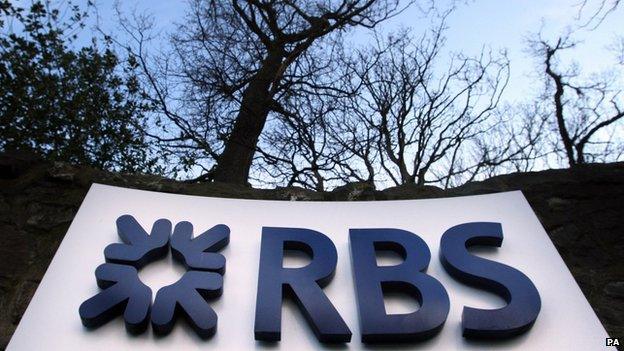RBS break-up backed by first minister
- Published

RBS has been 81% owned by the taxpayer since the financial collapse
The Scottish first minister has backed a break-up of RBS to split its risky investment bank from its mainstream retail and business lending arm.
Mr Salmond said he believed the structural change was necessary and would mirror what was happening elsewhere in Europe.
But he rejected the Banking Standards Commission's suggestion that the strong parts of the bank should be split from its troubled assets.
He said it was too late for that move.
Speaking to the BBC, Mr Salmond said: "If you were going to split between good and bad banks, you should have done that five years ago. The time for that is past."
But he said there should be a different split, between the riskier investment bank and the retail and business lending arm.
'Huge risks'
The first minister added: "That's a structural change that's necessary. It fits in with what's happening across Europe.
"We should give the Royal Bank the time to complete its recovery stage. It should be pointed in the direction of splitting the retail bank and the capital market 'casino' banking, which has huge risks attached to it."
Mr Salmond said an independent Scotland would "mirror" regulation in London.
But he said it could go its own way if Holyrood disagreed with the approach taken through the Bank of England.
Responding to publication on Wednesday of Westminster's Banking Standards Commission, Mr Salmond said its approach to RBS was "one of the weakest parts of the report".
Mr Salmond also said the Treasury's involvement in the departure of RBS chief executive Stephen Hester had undermined the Royal Bank's share price.
He said: "The Chancellor of the Exchequer has cost you and me, every one of us, a billion pounds by his disgraceful interference in sacking the chief executive of the Royal Bank of Scotland.
"He's the billion pound man. And that shows you the danger of accelerating timetables for political expediency."
Scottish regulator
Earlier this month, RBS announced Mr Hester was leaving by mutual agreement, though it subsequently became clear that he had not agreed to the government's terms for him staying on to see through the sell-off of the government's 81% stake in the Royal Bank.
Questioned by the BBC, Mr Salmond said that an independent Scotland would have a Scottish regulator which would "fit in with the regulation conducted under the new regulator" within the Bank of England. "That is a sensible approach," he added.
He went on: "We can mirror and parallel the regulation. Of course, if the regulation was to be deficient - if for example, some future Chancellor of the Exchequer wanted to go back to the Financial Services Authority (the regulator until reforms earlier this year) - the great advantage of independence is that we would have the opportunity to ensure Scotland wasn't included in that mistake."
Mr Salmond's comments came as Chancellor George Osborne said he did not want "a quick sale of our RBS shares".
In his annual Mansion House speech, Mr Osborne announced the government is preparing to sell its stake in Lloyds Bank back to private investors.
The chancellor said Lloyds - 39%-owned by the government - was in a good position and investor interest was growing.
He went on to say he would "only sell our stake in RBS when we feel the bank is fully able to support our economy and when we get good value for you, the taxpayer", but he said that moment was some way off for RBS.